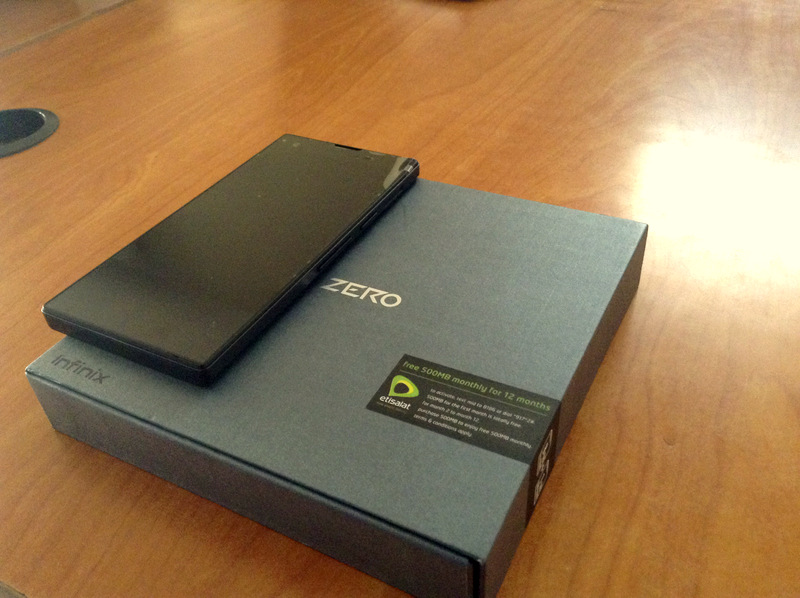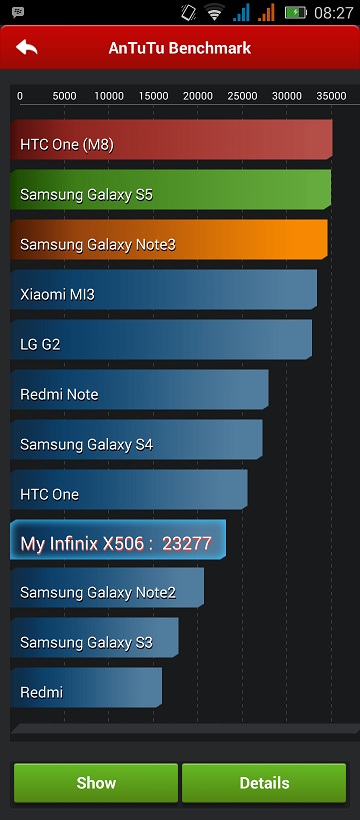There’s a new crop of ultra low-priced, high value smartphones proliferating the market. The Infinix Zero is the most recent of them. I’ve been with the device for a few days now and I’m still quite impressed by how much smartphone Infinix has been able to squeeze out of a 20k device.
The Infinix Zero features a Mediatek (MT6592) 1.4 GHz octa(8)-core processor and 1 GB of RAM (there is also a 2 GB RAM variation for 23k). This means it should easily outperform many devices in and above its class. And it looks like it does, at least on paper:
Yup, right there up there rubbing shoulders with the HTC One and bettering the Samsung Galaxy S3 and Galaxy Note 2. For perspective, the Samsung Galaxy S3 currently retails for 54k. You do the math.
But all that is theoretical, how about actual performance? In my past few days with the Infinix Zero, I have experienced no noticeable lag whatsoever. Navigating the UI is a joy and switching between apps is very fluid. I practically have between 8 and 13 apps always running simultaneously without any of them having to restart, and that includes the browser, notoriously known to reload virtually every time you switch apps, especially on low end devices.
I am not sure how much of my experience has to do with the KitKat operating system or the Infinix Zero hardware behind it. Actual performance of a device boils down to much more than just the number of processing cores. Other factors like how much memory is available (RAM), the GPU, the operating system and the quality of apps matter too.
Seeing as there isn’t a significant number of apps out there optimised to take advantage of multi-threading, multicore processors can only give you so much advantage now. The average app developer builds their app without any considerations for multiple cores. It’s just easier to deliver and maintain apps that way. So until we start having more apps that take advantage of multi-threading, you are actually better off with a higher clocked processor than more cores. In essence, a device powered by a 2.3 GHz quad-core processor should easily outperform a 1.4 GHz octa-core processor.
That being said, video and gaming performance on the Infinix Zero is stellar for its class. In fact, an average user probably wouldn’t notice the difference in comparison to really high end devices. High resolution (720p) videos render flawlessly and the gaming experience is just as impressive. It comes preinstalled with Asphalt 7, which happens to be optimised for quad-core processors. But for some weird reason, it often crashes before loading completely. I did however try my hands on Shine Runner (another quad-core optimised Android game) and I was quite satisfied with how well the device handled the game. I am not aware of any octa-core optimised games or apps or I would have tried them out. But I am pretty much satisfied with what I’ve seen so far
One more thing. I noticed the amount of space allocated for apps on the Infinix Zero and I almost cried tears of joy – 4GB. I don’t know about you but that’s more than enough space to store all my apps. Impressive stuff from Infinix. More reviews to come.






















